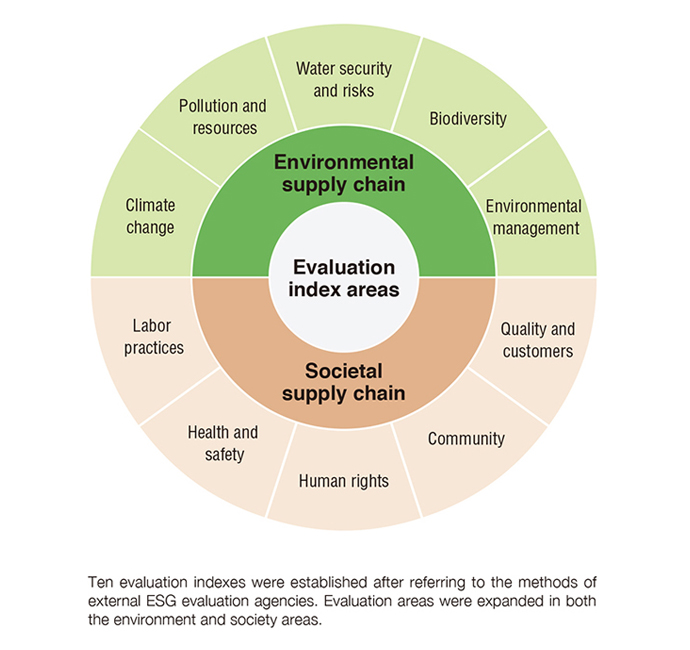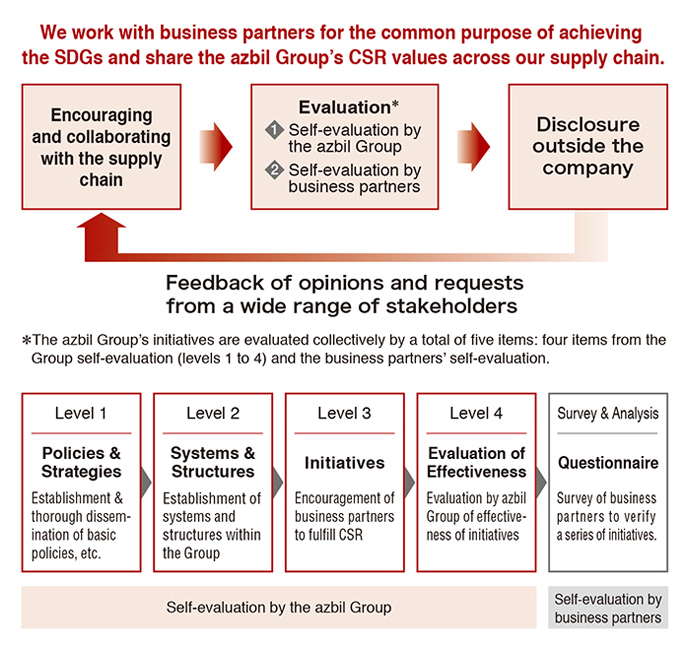Fulfillment of Social Responsibilities Together with Our Business Partners
For the shared goal of achieving the SDGs, the azbil Group has created a framework for working together with its partners to continuously improve fulfillment of responsibilities to society throughout the supply chain
The azbil Group has formulated four Essential Goals of the azbil Group for the SDGs, one of which was stated as “Supply Chain, Social Responsibility.” To fulfill its social responsibilities throughout the supply chain, including transactions involving raw materials and parts used in products, construction, engineering, and service, the Group is encouraging its business partners’ efforts and collaborating with them, as well as establishing a framework for evaluating and improving their efforts.
- Developing CSR initiatives in the supply chain since the early 2000s
- Group guidelines contain specific measures for fulfilling CSR
- Comprehensive action on the SDGs, including lower-level business partners
Developing CSR initiatives in the supply chain since the early 2000s
Guided by its philosophy “to realize safety, comfort and fulfillment in people’s lives and contribute to global environmental preservation through ‘human-centered automation’,” the azbil Group has positioned the SDGs*1 as important management guideposts in the effort to solve the increasing number of problems faced by society on a global basis and to achieve a sustainable world. In 2019 the azbil Group set four essential goals: (1) environment and energy, (2) new automation, (3) supply chain, social responsibility, and (4) health and well-being management, “an organization that never stops learning.” Since then, the Group has enhanced its initiatives with the aim of contributing “in series” to the achievement of a sustainable society.
Since the early 2000s, as part of its corporate social responsibility (CSR) efforts, the azbil Group has been working on initiatives involving the environment and society, which led to its current goal for the supply chain and social responsibility. For the environment, chemical substances regulated by RoHS*2 or REACH*3 are monitored in product components. If an amount exceeds the limit, we ask the business partner of the parts for improvement and check for corrective action. In addition, based on our “green procurement” policy, we select products and services that reduce the burden on the environment, and we ask business partners to give consideration to the environment in their products and services. At the same time, we share our energy-efficiency measures and expertise with business partners to help improve their environmental efforts, and check that their efforts meet certain standards. With regard to social issues, we request that our business partners conclude a 36 Agreement*4 and establish work rules so that appropriate working conditions can be ensured and risks resulting from long working hours or overwork can be avoided.
In connection with these supply chain initiatives, the azbil Group formulated the azbil Group Basic Procurement Policy in 2014, highlighting four aspects: (1) the public nature of the company and the fulfillment of our social responsibility, (2) observance of fair commercial transactions, (3) social conduct characterized by respect for people, and (4) promotion of environmental protection. In addition to disseminating the policy within the Group, we have been practicing, with the understanding of our business partners, procurement that takes into consideration corporate social responsibility throughout the supply chain.
Group guidelines contain specific measures for fulfilling CSR
Later, the azbil Group strengthened its efforts in the supply chain when it set the Group’s goals for the SDGs in 2019. Also, it created a new framework to encourage and collaborate with business partners in efforts to actively meet social responsibilities. Specifically, after examining the methods of external ESG*5 evaluation agencies, we set up indexes for evaluation in 10 areas related to the categories of environment and society. This is a comprehensive evaluation of a series of our CSR activities, including evaluation of the four steps of (1) policies and strategies, (2) systems and structures, (3) initiatives, and (4) evaluation of effectiveness, plus “survey and analysis” of efforts based on self-assessment questionnaires by the business partners. Each azbil Group company applies the PDCA cycle and continues to work on improvement together with its business partners. Also, the results of evaluation are disclosed so that feedback from stakeholders can be used for improvement.
In November of 2021, the azbil Group set up its CSR Procurement Guidelines, which serve as the standard for these initiatives and as an aid when requesting efforts from our business partners. The guidelines describe in detail what actions our partners should take in 10 areas related to the supply chain that affect the environment and society, along with the guiding principles of Azbil Corporation. For example, for climate change in the environment category, the guidelines refer to efforts to reduce greenhouse gas emissions and use renewable energy in general business activity and manufacturing processes. In the society category, the guidelines cover labor practices such as the elimination of overwork, compliance with laws and regulations on wages and allowances, and the necessity of measures to prevent discrimination based on race, nationality, gender, religion, beliefs, or physical disability.

Evaluation index areas in the supply chain

The azbil Group’s PDCA cycle for evaluating CSR activity in the supply chain
Comprehensive action on the SDGs, including lower-level business partners
In December 2021, a briefing on CSR procurement guidelines was held online and attended by 276 of our 313 major business partners. In a questionnaire, most partners expressed the positive opinion that they would like to strengthen their efforts. That means that our partners understand the necessity of improved efforts in the supply chain as a whole and the importance of such efforts for improving the value of their own companies.
Also, through analysis of the self-evaluation questionnaires from 502 partner companies, we found that there are variations in progress between different types of partners. For example, progress on the environment varies between manufacturing industries (parts manufacturers, etc.) and labor or service providers (construction, building equipment maintenance, building management companies, etc.). Information like this on the present situation is fed back into the azbil Group’s (1) policies and strategies, (2) systems and structures, and (3) initiatives so that we can focus on more effective encouragement of partners’ efforts and collaboration with them, continuously running the PDCA cycle.
From the viewpoint of fulfilling social responsibility that covers the entire supply chain, our efforts must include not only the business partners that the azbil Group directly deals with but also companies such as second or third tier business partners that our partners deal with. In this effort, the azbil Group is discussing effective approaches with the cooperation of direct partners. To achieve the supply chain and social responsibility goal, one of the essential goals of the azbil Group for the SDGs, by 2030, we are continuing to strive to fulfill both the environmental and societal aspects of our responsibilities throughout the supply chain.
*1 Sustainable Development Goals
International goals adopted at a United Nations summit in 2015 for the period from 2016 to 2030. Seventeen goals and 169 targets were established in order to achieve a sustainable, diverse, and inclusive society where no one will be left behind.
*2 RoHS Directive
A European Union (EU) directive restricting the use of certain hazardous substances in electrical and electronic equipment. The EU’s regulations on hazardous substances were first issued in 2002 and were fully revised in 2011.
*3 REACH Regulation
A comprehensive system consisting of registration, evaluation, authorization, and restriction of chemicals, which started on June 1, 2007 in the EU with the aim of protecting human health and the environment and also of improving the competitiveness of the EU chemical industry. REACH stands for registration, evaluation, authorisation, and restriction of chemicals.
*4 36 Agreement
A labor-management agreement in Japan that is required if a company wants to require workers to work overtime hours beyond the legally prescribed amount (8 hours a day, 40 hours a week).
*5 ESG
ESG stands for environmental, social, and governance. It expresses the idea that environmental, social, and governance concerns are necessary for the sustainable growth of society and of companies.
This article was published on October 1, 2022.


